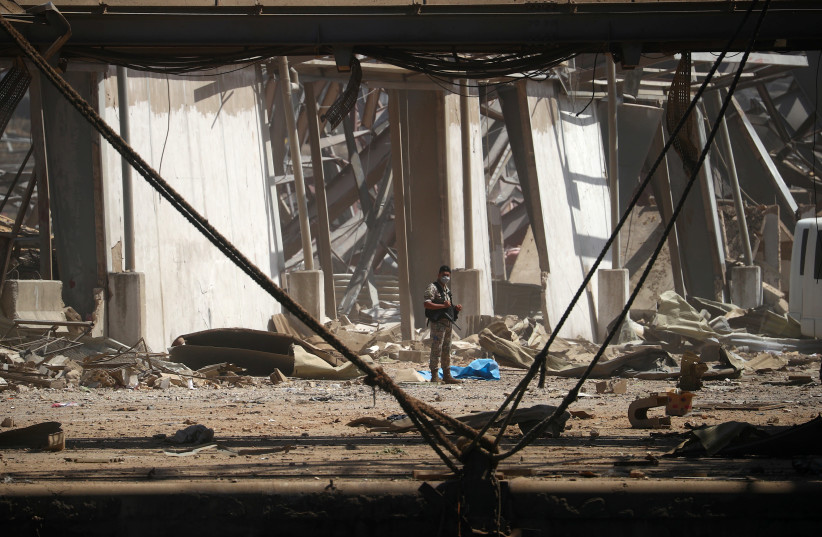The Lebanese Armed Forces have denied the existence of tunnels.
By SETH J. FRANTZMAN, JPOST AUGUST 11, 2020
A member of the army is seen at the site of Tuesday’s blast in Beirut’s port area, Lebanon August 8, 2020. (photo credit: REUTERS / HANNAH MCKAY)
Videos circulating online, as well as rumors and reports, indicate that “tunnels” have been found in the wake of the Beirut explosions. Some have asserted that this is evidence of Hezbollah “tunnels” storing weapons at the Port of Beirut, while others think they were used for human trafficking. Both SkyNews and Russia’s Sputnik News claimed there was a “labyrinth network of tunnels.”
The Lebanese Armed Forces have denied the existence of tunnels, just as Hezbollah has denied doing anything at Beirut Port. It’s unclear how the army could refute the claims without investigating the images and videos already circulating online. Nevertheless, the army denied the existence of tunnels.
Yet Sky News did show a ceiling of a subterranean chamber and noted that people had hope that loved ones might have survived the blast in the tunnels. The Sky News report, which was posted online on Sunday, said the people excavating the site and searching for survivors “know there is a labyrinth of subterranean chambers here; they have discovered the opening of one of them.”
This comment appears to indicate that the search-and-rescue teams and officials know about these chambers.
Are these “tunnels,” or is there another explanation for these underground rooms? There may be a more prosaic explanation for underground rooms or other aspects of the urban environment having underground infrastructure, such as tunnels for electrical, water and sewage facilities.
For now, the question of the “tunnels” appears to feed stories that Hezbollah was using the area for illicit trafficking of weapons or munitions. However, the investigators who found the opening to one alleged tunnel were not wearing any kind of suits or using devices as if the area was full of unexploded ordnance. That means there didn’t appear to be a concern that they would find missiles and dangerous items inside these areas.
Nevertheless, the quick denial by Lebanon that these areas exist and the video of the subterranean chamber or “tunnel” seems to illustrate that Lebanon is still afraid to fully investigate the area for fear of finding the suspicious activities that those critical of Hezbollah allege were taking place here.
Hezbollah is known to have expertise in building tunnels and underground bunkers.




@ linda goudsmit:
No of course not, Lebanese people are not free, Hezballahoccupy the country, but even some Lebanese are antisemitic- Helen Thomas(the Toad) and Issa Darrell a o
And this is a surprise?